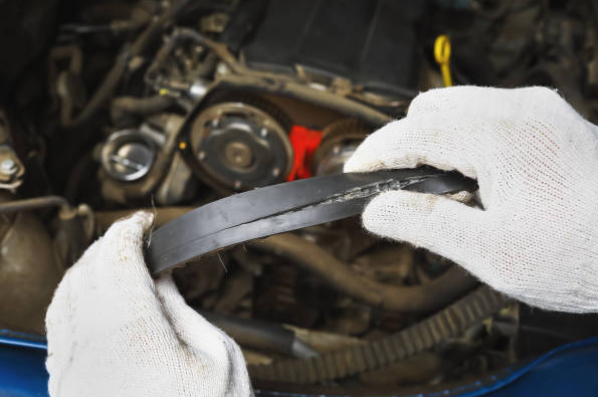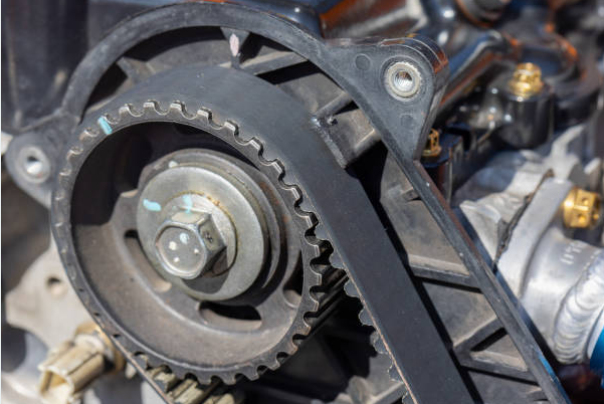Engines don’t scream for help. They don’t whine and don’t flash a big red warning saying, “Hey, your timing belt’s about to snap.” Instead, they just stop. One second, you’re cruising down the Sheikh Zayed Road, and the next, you’re stuck, wondering why your VW Passat won’t start. That’s the brutal reality of a failed timing belt. No warning, no mercy.
If you own a Volkswagen Passat, especially models with a turbocharged engine, timing belt replacement isn’t a “maybe later” kind of thing. That’s where our garage comes in. We’re not just another shop that throws parts at a problem and hopes for the best. We know Volkswagen inside out, and we fix every issue the right way—with OEM-grade parts, factory-level diagnostics, and expert technicians who understand how your Passat’s turbocharged engine works.
Need a timing belt replacement? We’ve got you. Do you have a coolant leak, turbo lag, or an ABS warning light? We handle that too. Whether it’s routine maintenance or a major repair, we make sure your Volkswagen runs like new—because in Dubai, where the heat is brutal and reliability matters, you need a garage that gets it right.

Volkswagen recommends replacing the timing belt every 90,000 to 120,000 km, depending on your model year and driving conditions. But let’s be honest—Dubai’s extreme heat and stop-and-go traffic shorten that lifespan.
Ignoring your timing belt isn’t just risky; it’s expensive. A broken belt means a full engine rebuild or replacement, and that’s not something you want to deal with.
FACT: Unlike timing chains, timing belts don’t give second chances. They snap. And when they do, they take your engine with them.
If your VW Passat idles roughly, struggles to start, or misfires, you might already be on borrowed time. In some cases, you’ll hear a chirping or ticking sound from the belt area. By the time it starts slipping or shredding? It’s game over.
Let’s be blunt—ignoring this is like playing chicken with your engine’s life. In Dubai, where a tow truck on a scorching summer day isn’t exactly fun, it’s better to fix it before it fails.
Not all Volkswagen Passat models use a timing belt—some come equipped with a timing chain instead. But if you’re experiencing performance issues, it’s important to know what’s under your hood.
Timing Belt or Timing Chain? Know the Difference
Most older VW Passat models and some turbocharged variants use timing belts, while newer models tend to have timing chains. But don’t assume a timing chain lasts forever—if it stretches.


Engines don’t just fail out of nowhere. They give you hints—small warnings that something’s off. Ignore them, and you could be looking at catastrophic engine damage. The timing belt is no exception.
If your VW Passat’s timing belt is on its last legs, your car will show signs. The trick is catching them early—before it’s too late.
💡 Pro Tip: If you notice any of these signs, don’t wait. A broken timing belt doesn’t just stop the engine—it destroys it. Get your VW Passat timing belt replacement done before it’s too late.
Delaying a timing belt replacement means risking catastrophic engine failure. Many drivers who wait end up needing more than just a new belt—they end up looking at a full engine overhaul or even a complete VW Passat Turbo Replacement.
At our Volkswagen repair shop, we check timing components, turbo health, and overall engine condition to ensure your car runs perfectly. Don’t gamble with your engine—fix the problem before it breaks everything else.
Timing belts don’t just snap without warning. They stretch, crack, and quietly sabotage your engine’s performance before giving out completely. That’s why a VW Passat timing belt replacement isn’t just about swapping out an old belt—it’s about ensuring your entire engine stays in sync.
Here’s how we do it:
Before touching anything, we inspect the timing system for wear, leaks, and misalignment. Timing belts are buried under multiple covers, so accessing them means removing:
Since timing components are interconnected, we also check for signs of water pump leaks and tensioner wear.
Once exposed, the old timing belt is carefully removed to avoid disturbing the camshaft and crankshaft alignment. One wrong move, and engine timing is thrown off, leading to potential valve damage.
💡 Timing Chain vs. Timing Belt? Some engines use chains instead of belts. The VW Passat uses a timing belt, which needs periodic replacement, unlike a chain that lasts longer but isn’t maintenance-free.
A new OEM or high-quality aftermarket belt is fitted precisely, along with a VW Passat water pump replacement if needed. We also replace:
Once installed, we double-check timing marks, manually rotate the engine, and run it to ensure everything is aligned. No surprises, no mistakes—just a flawless Volkswagen engine service.
🔧 Done right, your new timing belt will last another 90,000+ km. Get your VW Passat timing belt replacement before your old one calls it quits!
The VW Passat timing belt replacement cost varies based on model year, labor time, and additional part replacements. Here’s what you’re looking at:
🔧 Why the price difference? Some Passat models have tighter engine bays, making the job more labor-intensive. And skipping tensioners and pulleys? Bad idea. A worn-out tensioner can destroy a brand-new belt, leading to catastrophic engine damage.
💡 TIP: If your car has over 100,000 km, replace the water pump along with the timing belt. A failed water pump means redoing the entire job—doubling your costs.
Seen those too-good-to-be-true service deals? Some garages cut corners by using low-quality aftermarket belts or skipping crucial parts like tensioners. That’s a ticking time bomb.
Seen those too-good-to-be-true service deals? Some garages cut corners by using low-quality aftermarket belts or skipping crucial parts like tensioners. That’s a ticking time bomb.
Worst case? The belt fails early, the engine loses timing, and suddenly, you’re not just replacing a belt—you’re looking at major engine repairs.
We don’t do shortcuts. At our Volkswagen repair shop, we use OEM-grade parts, precise installation, and expert hands. Pay once, get it done right.
We don’t take shortcuts. At our Volkswagen repair shop, we use OEM-grade parts, precise installation, and expert hands. Pay once, get it done right.
We’ve lost count of how many VW Passat timing belt replacements we’ve done. But here’s the thing—every single one was done before disaster struck.Here are a few recent cases from our workshop:
A customer brought in their Volkswagen Passat for routine service, unsure if the timing belt needed replacing. After checking the service history, we found it was still on the original belt—way overdue. The belt showed clear signs of wear, with minor cracks and tension loss. We replaced it along with the water pump and tensioners. The result? A smooth, reliable engine ready for another 90,000 km.
This one was close. The owner ignored early signs—rough idling, power loss, and engine noise. By the time they came in, the timing belt was hanging on by a thread. Luckily, we caught it in time. After a full timing belt replacement, the car ran like new again.
Some owners don’t take chances. This Passat had a fully intact belt, but the owner wanted it changed early for peace of mind. Smart move. Preventative maintenance beats engine repair any day.
Not all VW Passat timing belt replacements are the same. Some mechanics rush the job, skip important parts, or use cheap aftermarket belts that won’t last. That’s not how we do things.
Here’s why Passat owners trust us:
✅ Certified VW Mechanics – Our team specializes in Volkswagen repair, ensuring precise belt alignment and proper engine timing.
✅ OEM & Genuine Parts – We only use high-quality timing belts, tensioners, and pulleys—no second-rate materials that fail early.
✅ Comprehensive Service – Every VW Passat timing belt replacement includes a full inspection to catch worn-out parts before they cause damage.
✅ Affordable, Transparent Pricing – No hidden charges, no unnecessary upsells—just honest Volkswagen repair at competitive rates.
✅ Customer Satisfaction Guarantee – Our job isn’t done until you’re happy. We stand behind our work with trusted auto service in Dubai.
You need experienced technicians who do it right the first time—because a poorly installed belt can be worse than an old one.
📍 Book your VW Passat timing belt replacement today and drive with confidence! 🚗
Volkswagen recommends every 90,000 to 120,000 km, but Dubai’s heat and traffic can shorten that lifespan. We suggest checking it by 90,000 km to avoid sudden failure.
A broken belt means catastrophic engine damage—bent valves, damaged pistons, and possibly the need for a VW Passat Turbo Replacement if debris gets into the turbo system.
Timing belts wear out faster but are quieter and cheaper to replace. Some VW models have chains, but belts require more frequent maintenance.
It varies based on parts and labor, but expect AED 1,500 – 4,000 depending on the condition of tensioners, pulleys, and the water pump.
Technically, yes, until it breaks. And when it does, you’re looking at a complete engine rebuild or a VW Passat Turbo Replacement if the damage spreads. Don’t risk it.
